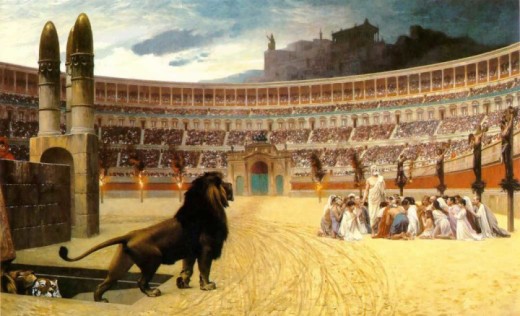Polycarp lived from about A.D. 65 to 155, and finds himself among the greatest Christians the world has ever witnessed. He was a friend of and fellow pupil alongside Ignatius under the apostle John. Archbishop James Ussher identified Polycarp as the angel of the church in Smyrna,[1] spoken of by Jesus Himself in Revelation 2:8.[2] This is quite likely given that Polycarp was the pastor of this congregation during the period in which Revelation was written in A.D. 95-96. The Romans attempted to burn Polycarp at the stake, where before a stadium crowd, the flames miraculously refused to touch him. Finally, Polycarp was martyred when an executioner pierced him with a dagger, resulting in blood spilling out so profusely that it quenched the flames.[3]
It is one of the great disappointments of Church history that Polycarp’s sole extant work is his epistle to the Philippians. In this precious letter we find a brief summary of the end times that indicates chiliasm or a premillennial view:
If we please Him in this present world, we shall receive also the future world, according as He has promised to us that He will raise us again from the dead, and that if we live worthily of Him, “we shall also reign together with Him,” provided only we believe. In like manner, let the young men also be blameless in all things…since “every lust warreth against the spirit;’ and ‘neither fornicators, nor effeminate, nor abusers of themselves with mankind, shall inherit the kingdom of God,”…[4]
While Polycarp does not specifically mention a period of a thousand years, he does affirm several key distinctives of Premillennialism. Saints are to reign with Jesus only after they are resurrected. In instructing on how to inherit this future age Polycarp quotes 1 Corinthians 6:9, thereby equating the period after the resurrection with the kingdom. Such teachings would not have been found in any eschatological view outside of Premillennialism.
In defending the blessings to be found in the millennial kingdom, Irenaeus wrote, the elders who saw John, the disciple of the Lord, related that they had heard from him how the Lord used to teach in regard to these times…[5] Remember that Polycarp was a student of the apostle John and the teacher of Irenaeus. He is very likely one of these elders that delivered teachings on the Millennium. Irenaeus soon after wrote that the millennial blessings were, borne witness to in writing by Papias, the hearer of John, and companion of Polycarp…[6] This supports the conclusion that Polycarp was one of the premillennial elders and reminds us that Polycarp was associated with yet another premillennialist in Papias. Even though we have no conclusive evidence that Polycarp held to the complete premillennial system, the circumstantial evidence is compelling.
[1] An angel can be any kind of messenger or envoy and is not always a supernatural being.
[2] Alexander Roberts, James Donaldson and Arthur Cleveland Coxe, eds., the Ante-Nicene Fathers Volume I – the Apostolic Fathers with Justin Martyr and Irenaeus, 31.
[3] Ibid., 42. The Encyclical Epistle of the Church at Smyrna, ch. XVI.
[4] Ibid., 34. Polycarp, the Epistle of Polycarp to the Philippians, ch. V.
[5] Ibid., 562. Irenaeus, Against Heresies, bk. V, ch. XXXIII.
[6] Ibid., 563. Irenaeus, Against Heresies, bk. V, ch. XXXIII.


I’m horrified that a wonderful young man I know who has been diligently searching the scriptures, has recently somehow been duped into amillennialism. People call eschatology “non-essential” but that is so false. Its not essential to salvation, but it’s essential for the times we are living in. Just gathering up more information to persuade him back to the truth.
Well said sister.
You’re so right. I was under the impression that eschatology was inessential for a large part of my walk, simply because I got too obsessed with it as a new believer and was convicted that I was focusing too much on it.
However that doesn’t meant that it’s unimportant! And more recently I’ve begun studying into it finally and am baffled by how large a portion of scripture is dedicated to it.
I don’t find that conclusive that Polycarp or Iranaeus were pre-millennial.
Thank you for the comment. I didn’t say that it was conclusive in regard to Polycarp. That being said, can you explain how the distinctives of Premillennialism that he espoused fit into another system? And this article does not get into Irenaeus’ Premillennialism. You can find that information here.
There are no descriptions of the millennial that Polycarp believed in. Does the earthly millennial kingdom of God have mortals living inside it? Does sin and death still exist?
Yes to both questions. I explain in detail here: https://www.amazon.com/One-Thousand-Years-Jesus-Messianic-ebook/dp/B06Y3YFJVP/ref=sr_1_2?dchild=1&keywords=one+thousand+years+with+jesus&qid=1606094036&sr=8-2
Thank you Mathew! An excellent and well researched work.
Thank you brother.